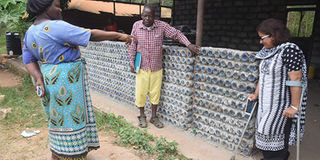Plastic abode for orphans

Majority of people will throw away plastic bottles after drinking from them for lack of a better use for them. However, to the children at Restoration Orphanage at Mbungoni Kilifi County, the used bottles are an important raw material that has sheltered them.
As we arrive at the orphanage, two constructors sitting in front of a neatly built plastic wall are busy filling empty water bottles with sand.
Reading our surprised stares, 44-year-old Ms Nafisa Khanbai, explains that they are substituting blocks with the recycled bottles to construct a four-bedroom orphanage.
“We aim to conserve the environment while at the same time teach locals that they can recycle plastics to make something useful,” she says.
ABANDONED CHILDREN
The front part of the house is made of plastic bottles, while stone blocks have been used at the back.
The orphanage was founded by 57-year-old Pastor James Mwayangwa and his wife Ms Margaret Mwatela to give shelter to abandoned children.
It accommodates 37 children aged between three - 17 years.
“We both lost our parents at a tender age, my husband went through a lot of challenges, so he started this orphanage to protect children,” said Ms Margaret.
Lack of enough space to accommodate the growing number of children drove them to seek help from Ms Nafisa Khanbhai who came up with the idea of using water bottles to construct a house.
“We think it is a good idea because we only spend money on cement. Unlike the mud house we used before that was in poor condition, this new structure is better,” said Ms Margaret.
ENVIRONMENTAL POLLUTION
She adds that they are happy to take part in the fight against environmental pollution.
Ms Khanbhai the founder of Dear Diary Initiative Kenya that focuses on charity programs says she got the idea from the Internet.
“While doing my research, I saw some people have successfully built a house using recycled plastics in England and even in Kenya, so I said why not give it a try,” she says.
Asked where she gets the bottles Ms Khanbhai says well-wishers support her initiative.
“I posted an appeal on my social media page and the outcome has been good. We have already used 10,000 bottles and still looking for more,” she says adding that to complete the orphanage, they may need about 50,000 more bottles.

COLLECTING BOTTLES
Ms Khanbhai says after collecting the bottles, they empty them then fill them with sand to make them hard. They then arrange them in a line and hold them together using cement to make a wall.
“This method of constructing a house is very affordable and eco-friendly. Plastering is not necessary since the protruding parts of the bottles create beautiful patterns,” says Ms Khanbhai.
She says recycling of plastic bottles is part of an initiative to stop the catastrophic environmental effect on the planet, from animal extinction to water, and air pollution.
“We have made a huge mess on this planet and it’s important to find new and creative ways to stop and restore the damage. So, when someone comes up with a great eco-friendly idea, we take it up encourage and support it.”
She says the move is to teach local communities how to recycle their own plastics and raise awareness of the destructive nature of single-use plastics as part of the plastic revolution campaign.
CUTTING TREES
Ms Khanbhai encourages locals to embrace technology in environmental conservation and stop cutting trees.
“Forests have been depleted because people are cutting down trees to make charcoal and houses. If we all decide to use plastic, we can save trees and protect our environment from plastic menace,” she says.
Plastic pollution is a growing global problem, with patches of sea covered in plastic that strangles or poisons wildlife.
The United Nations predicted that by 2050, there will be more plastic in the ocean than fish, unless drastic action is taken
In August 2017, Kenya introduced one of the world’s toughest bans on plastic bags, mandating four years in prison or a fine of Sh5 million for using one. Kenya is now looking into measures of controlling plastic bottles.




